University of Oxford denies request to release emails related to Prof Sunetra Gupta's visit to the United States in October 2020
Reading testimony submitted by University of Oxford professor Sunetra Gupta to the UK COVID Inquiry in 2023, I encountered statements related to her U.S. visit in autumn of 2020.
Picking up on page 9, number 31, after a description of a Zoom meeting with UK Cabinet officials that also included Carl Heneghan, Anders Tegnell, John Edmunds, and Angela McLean, Gupta said,1
31. The following week, an open letter was published by myself and Profs Carl Heneghan and Karol Sikora (with 23 other signatories) with “the intention of providing constructive input into the choices with respect to the COVID-19 policy response”. I was subsequently contacted by academics in USA (with none of whom I had any previous professional or personal contact) who were also keen to open up the discussion to consider alternatives to lockdown and met with Profs. Martin Kulldorff and Jay Bhattacharya (we were joined remotely by Dr. Stefan Baral) at a press conference in Great Barrington, Massachusetts. The so-called “Great Barrington Declaration” [exhibit SG/05 INQ000250981] arose out of our deliberations and was published on October 4, 2020. It is entirely incidental that this occurred on the premises of the American Institute for Economic Affairs2; we were not in their pay, nor were we driven by any alignment with their politics (I am a strong advocate of the welfare state); they merely offered a venue. On October 6th, Profs. Bhattacharya, Kuldorff and myself met in Washington DC with United States Secretary of Health and Human Services (Alex Azar) and outlined our position to him. We also met with advisor on the White House Coronavirus Task Force, Professor Scott Atlas, who shared many of our views on the impacts of lockdowns to the poor and the young.
32. Following this, I and many of the academics named above became victims of a vicious campaign to silence and impugn us. Many of my energies have been consumed by resisting these accusations and dealing with the distress caused to myself and my family. We were branded as right-wing extremists, in the pay of the Koch Brothers. The MP Neil O’Brien and others established a website (exhibit SG/06 - INO000250982)3 to attack us specifically. Many seized on a statement offered to Freddie Sayers, editor of UnHerd, in May 2020 that the epidemic was on its way out; while it may have been awkwardly worded, it certainly was not my intention to convey that infection levels would never rise again. If I had truly believed this then I would have hardly wasted my time formulating a plan for the winter of 20/21 on the basis that there would be a second wave.
Two of the questions raised by this testimony are
Who all contacted Professor Gupta?
Did any U.S. government officials or staff contact her as well?
Request
To find out, I submitted a request on 22 September 2025 for
all emails sent to and from Professor Sunetra Gupta between 1 September 2020 and 31 October 2020 containing the words “Great Barrington” and/or Massachusetts
all emails sent to and from Professor Sunetra Gupta between 1 September 2020 and 31 October 2020 from U.S. officials or staff of U.S. officials with email addresses
I received confirmation of the request the next day and was told to expect a response by October 20th, which I did receive on that date. (Images below)
Response
Prof Gupta’s university email is un-redacted in the response above I chose to redact for public posting.
20 October 2025
Dear Dr Hockett
I write in reply to your email requesting the information detailed above. The University holds correspondence which falls within the scope of your request. However, we consider that this information is exempt from disclosure under s40(2) of the Freedom of Information Act (FOIA).
The correspondence contains Professor Gupta’s personal data, that is, information that identifies and relates to her. Section 40(2) provides an exemption from disclosure for information that is the personal data of an individual other than the requester, where disclosure would breach any of the data protection principles in Article 5 of the UKGDPR. We consider that disclosure would breach the first data protection principle, which requires that personal data is processed lawfully, fairly and in a transparent manner. Disclosure would be unfair to Professor Gupta, because it would be contrary to her reasonable and legitimate expectations. There are two reasons for this.
Firstly, she is not a member of the University’s senior management team with responsibility for planning, directing or controlling the activities of the University. Nor is she a head of department. Consequently, she would not reasonably expect that information about her would be made public under the FOIA without her consent; and
Secondly, Professor Gupta has been the target of hostile and abusive comment as a result of academic opinions she has expressed on management of the pandemic. She has received aggressive emails that have caused her (and members of her family) considerable distress. The disclosure of the information requested would be likely to trigger further comment of this nature and add to the distress already caused.
For the reasons stated above, there would be no lawful basis to disclose the information under Article 6.1(a) of the UKGDPR.
Since the request is specifically for correspondence involving Professor Gupta, there is no possibility of releasing information in an anonymised form.
The exemption in section 40(2) is an absolute exemption and not subject to the public interest test provided for in section 2(2)(b) of the FOIA. To the extent that the public interest would be relevant, the University considers that the disclosure of the information requested is not necessary to meet a legitimate public interest that would outweigh the rights of Professor Gupta.
INTERNAL REVIEW
If you are dissatisfied with this reply, you may ask the University to review it by e-mailing foi@admin.ox.ac.uk. A request for internal review should be submitted no later than 40 working days from the date of this letter.
THE INFORMATION COMMISSIONER
If, after the internal review, you are still dissatisfied, you have the right under FOIA to apply to the Information Commissioner for a decision as to whether your request has been dealt with in accordance with the FOIA. You can do this online using the Information Commissioner’s complaints portal.
Yours sincerely
Information Compliance Team
Reaction
So, as anticipated, Oxford does have emails that meet one or more of the parameters I outlined. Unexpectedly, they invoked Section 40(2) of the FOIA and claimed that “disclosure would be unfair to Professor Gupta, because it would be contrary to her reasonable and legitimate expectations.”
Based on my cursory reading of the relevant statutes, it’s not clear how release would necessarily or predictably amount to disclosure of personal data (which the Information Compliance Team defines as “information that identifies and relates to her”) or why specific personal details, such as a home address, could not simply be redacted.
I also fail to see how releasing the records could be contrary to Professor Gupta’s expectations, given that she has referenced these records in public testimony submitted to both the UK COVID Inquiry and the Scottish COVID-19 Inquiry.
In the above excerpt, Gupta says she was contacted about her lockdown position by U.S. academics she didn’t know and invited to a press conference in Great Barrington, Massachusetts, hosted by an American organization at a specific venue. This aligns with basic, known facts and raises the question of who those academics were and what they said. What they said to her is (frankly) of greater interest than her replies, which were likely straightforward and professional.
Gupta also says she traveled from Massachusetts to Washington, D.C., to meet with then-HHS Secretary Alex Azar on 6 October 2020 and White House Coronavirus Task Force advisor Scott Atlas. These meetings are confirmed by contemporaneous news reports and by Azar’s posts to X (Twitter) on 5 October 2020.4
So a well-credentialed theoretical epidemiologist from another country was invited and flown to the U.S. during a period of restricted travel and widespread closures, where she met face to face in an advisory capacity with a high-ranking government official. Why AIER and the Trump administration sought an “outside” epidemiologist, as though there were no other qualified “anti-lockdown” candidates (besides Jay Bhattacharya and Martin Kulldorff) living on American soil, is a bit puzzling, in hindsight.5
However, there is certainly no fault on Professor Gupta’s part for accepting the invitation. Most academics do the same when offered the chance to potentially influence public policy, regardless of the host country. Since such meetings are normally arranged through official channels, it is more than fair to infer that Gupta either did receive or could have received communications from Secretary Azar, his staff, or other individuals using public email accounts with government extensions (.gov). Any genuinely personal information in the correspondence can and should be redacted.
I defer to legal experts in the UK, but “disclosure of the information requested would be likely to trigger further comment of this nature and add to the distress already caused” seems like it would fall outside the bounds of the law* as a valid basis for denying release. Academics in the public eye can and do expect criticism; it comes with the territory and (within limits) is part and parcel of rigorous intellectual training.
Oxford’s position seems to be that Professor Gupta has a “right” to not feel distressed, and that the university’s role is to protect that right.
But who and what is actually being protected here? Is it reasonable to wonder whether a researcher who has been remarkably consistent across her publications and statements is effectively being used to shield the order of events and political strategy from public view?
Releasing the correspondence can only confirm, corroborate, and extend what is already known and claimed. Withholding it gives rise to speculation.
I am “dissatisfied with the reply” and will submit a request for internal review.
* Sentence revised slightly post-publication with more cautious, precise language
All Wood House 76 articles related to the Great Barrington Declaration:
Great Barrington Declaration
Articles/posts and documents related to or which mention the Great Barrington Declaration and its authors Jay Bhattacharya, Sunetra Gupta, Martin Kulldorff
Links to related content added for reader reference and are not in the submitted statement.
Misstatement: The organization was American Institute for Economic Research
I was unsuccessful in my attempt to locate this document but Prof Gupta seems to be referring to the defunct https://antivirusfaq.org, discussed in “The information warriors fighting ‘robot zombie army’ of coronavirus sceptics” and other news outlets in early 2021.
This is a day earlier than Prof Gupta recollected in her submitted statements but jet lag can be disorienting and Azar posted about the meeting on 5 October 2020, at 6:36 US Eastern, which is 6 October 2020, 12:36 am, London time. (Images in my article above show as 5:36 because I am in the US Central time zone.)
As a taxpayer, I am also interested in knowing who paid for the flight: AIER or the federal government?


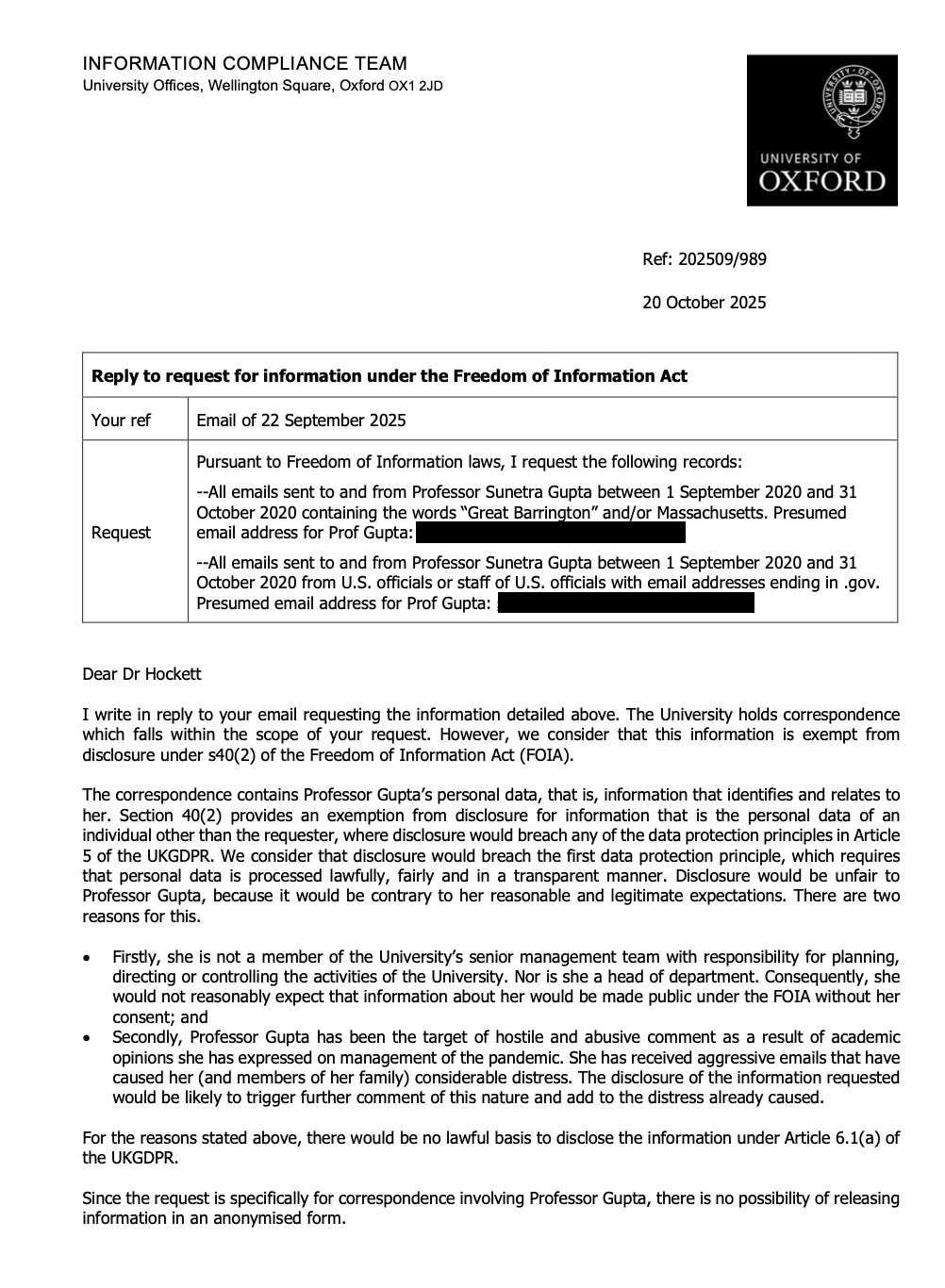
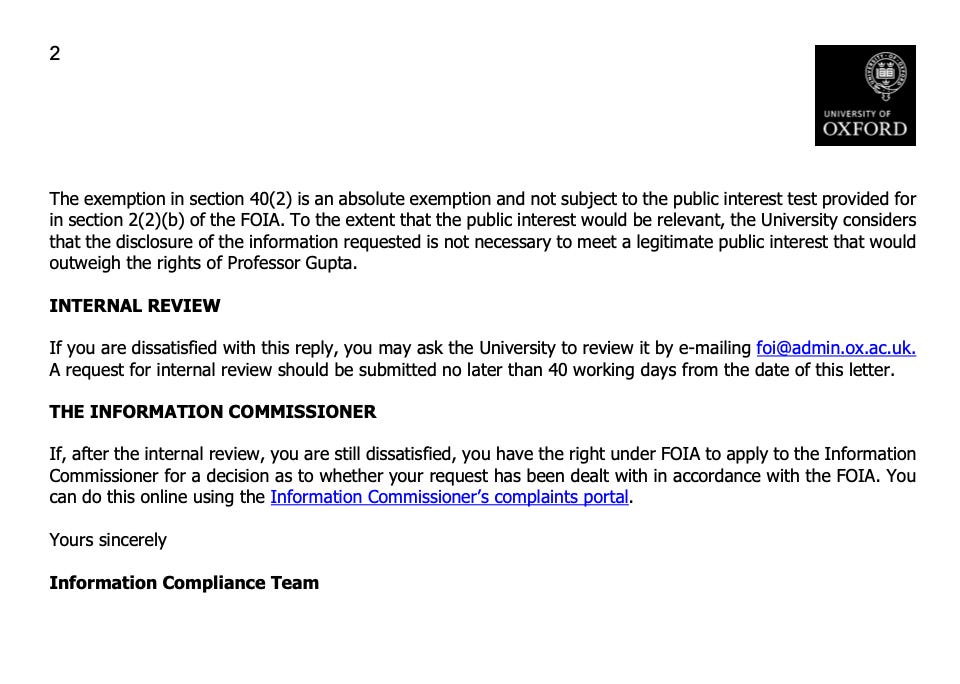
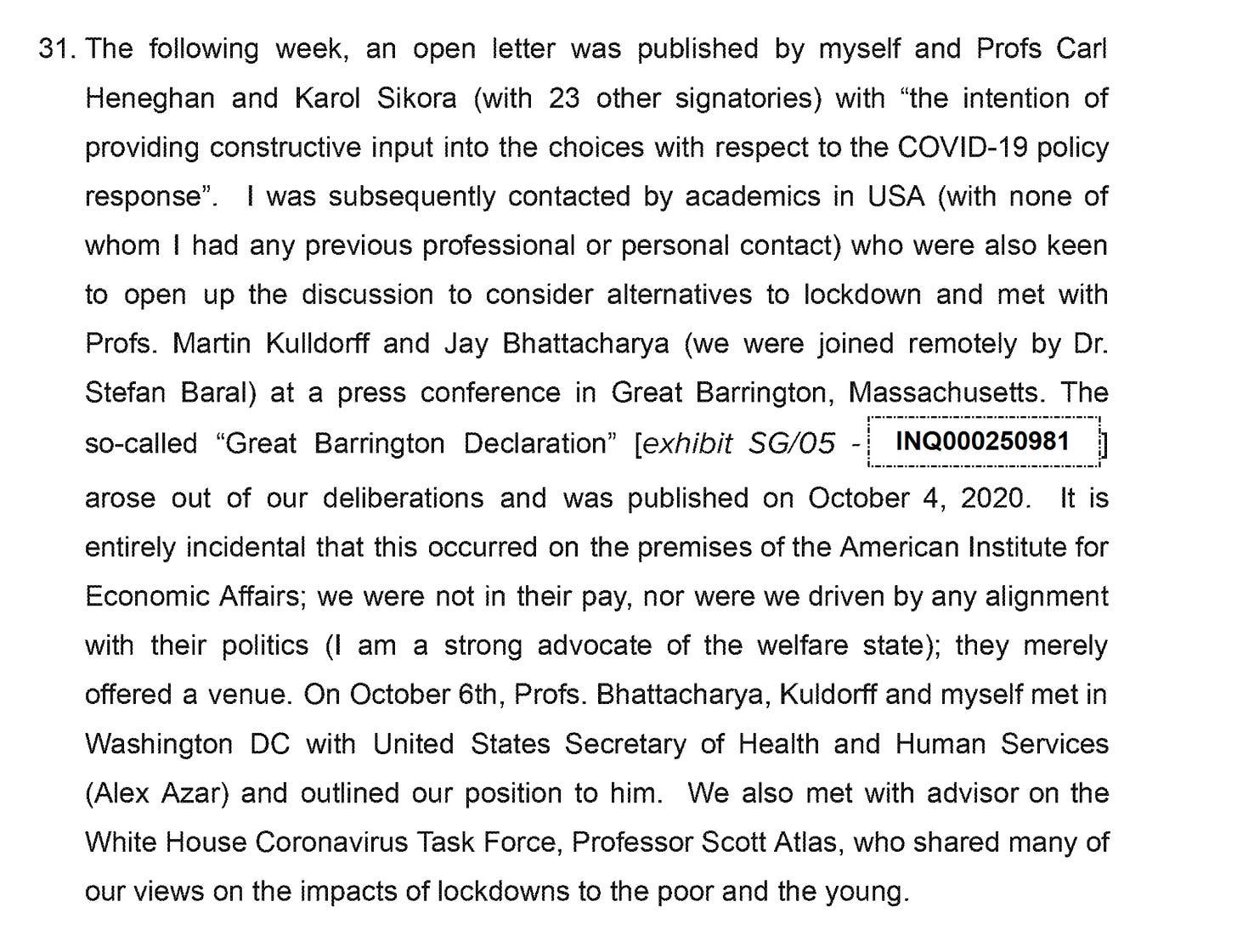
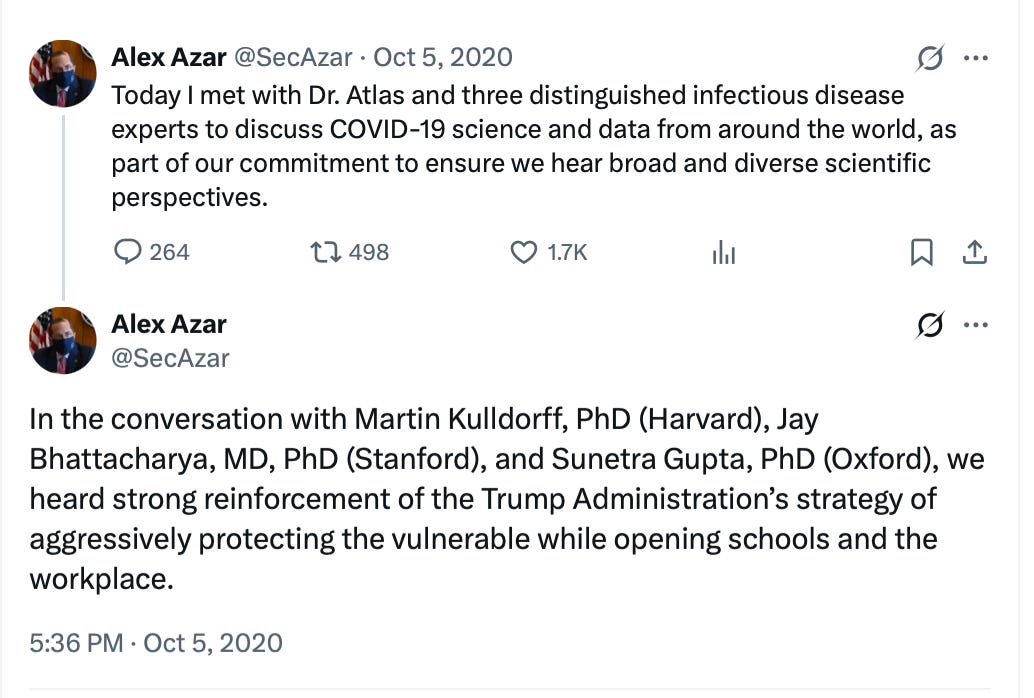

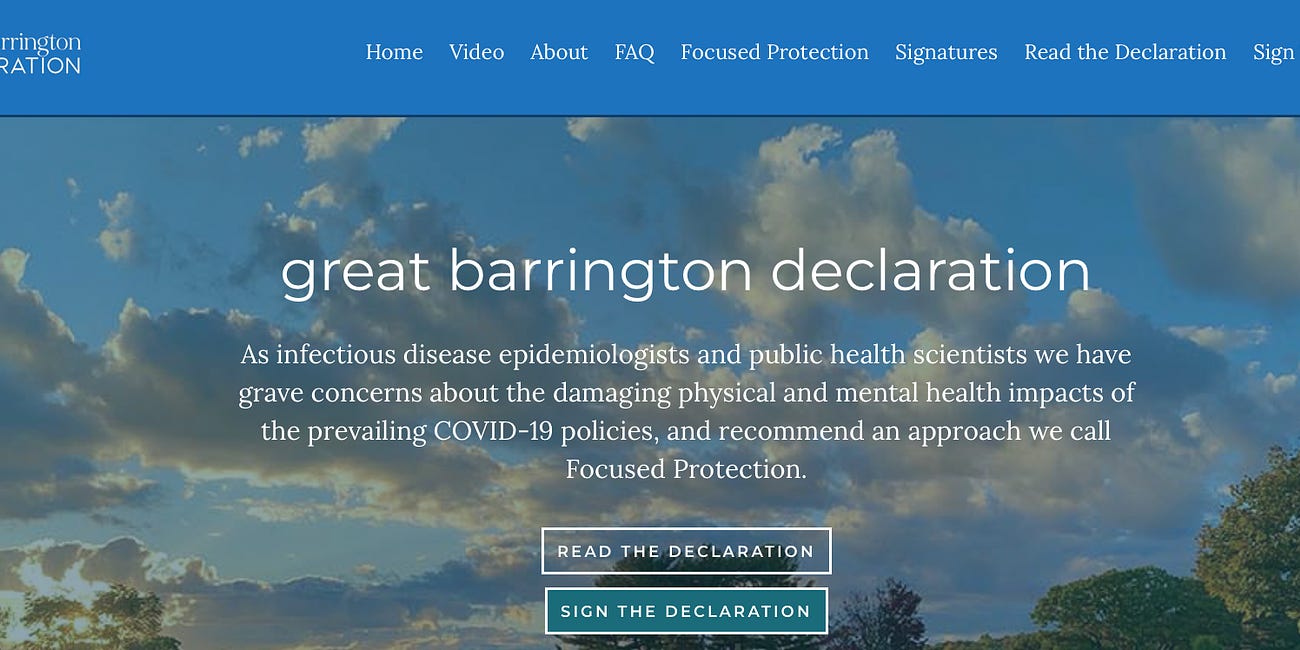
This denial reminds me a bit of the one Cambridge issued for Norman Fenton's request.
https://wherearethenumbers.substack.com/p/academic-fear-mongering-update
https://www.woodhouse76.com/p/a-good-example-of-why-the-covid-19
https://sanityunleashed.substack.com/p/someone-is-sponsoring-an-entire-programme
https://wherearethenumbers.substack.com/p/only-we-can-save-the-world
FOIA is different in the UK and distress is a valid grounds.
I’m guessing the good doctor is not willing to join you in requesting the release of these records? That would certainly undermine the objections.